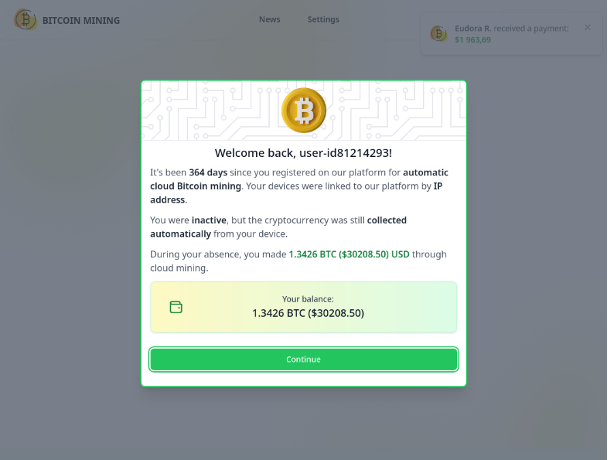According to a new report from security firm Kaspersky, the financial threat landscape in 2022 has changed significantly. While attacks using traditional financial threats such as desktop and mobile banking are no longer so common, cybercriminals are gradually shifting their attention to new areas, including the cryptocurrency industry.
In 2022, cryptocurrency scams were classified as a separate scam category and saw a significant increase of 40%, with 5,040,520 cryptocurrency scams detected compared to 3,596,437 in 2021. This increase can be partly explained by the “turbulence” of the cryptocurrency market last year. Currently, there is no accurate prediction of the trend of cryptocurrency scams, which largely depends on users’ trust in this virtual currency.
Specifically, users receive an English PDF file via email, stating that they have registered for a cloud cryptocurrency mining platform a long time ago and need to withdraw their funds immediately because their account is inactive. The PDF file contains a link to a fake mining platform. To withdraw their cryptocurrency, users must fill out a personal information form, including their card or account number, and pay the commission via an e-wallet or directly to the specified wallet address.

An example of a crypto scam in action occurred in February 2023
“Despite some problems that have occurred in the cryptocurrency market over the past six months, in the minds of many people, cryptocurrencies remain a symbol of getting rich quickly without much effort. Therefore, the resources of scammers in this area will not run out. To lure victims into their networks, scammers will continue to come up with new and more interesting stories,” said Olga Svistunova, security expert at Kaspersky.
To prevent these attacks, security firm Kaspersky recommends:
- Beware of phishing scams: Scammers often use phishing emails or fake websites to trick people into revealing their login information or private keys. Always double-check the website URL and don't click on any suspicious links.
- Don't share your private keys: Your private keys unlock your cryptocurrency wallet. Keep them private and never share them with anyone.
- Research before investing: Before investing in any cryptocurrency, research the project and the team behind it thoroughly. Check the project’s website, whitelist, and social media channels to ensure the project is legitimate.
- Install an additional security tool: For example, Kaspersky Premium prevents all known and unknown forms of cryptocurrency fraud, as well as the unauthorized use of your computer's processing power for cryptocurrency mining.
Source link


![[Photo] Overcoming all difficulties, speeding up construction progress of Hoa Binh Hydropower Plant Expansion Project](https://vstatic.vietnam.vn/vietnam/resource/IMAGE/2025/4/12/bff04b551e98484c84d74c8faa3526e0)

![[Photo] Closing of the 11th Conference of the 13th Central Committee of the Communist Party of Vietnam](https://vstatic.vietnam.vn/vietnam/resource/IMAGE/2025/4/12/114b57fe6e9b4814a5ddfacf6dfe5b7f)



























































































Comment (0)